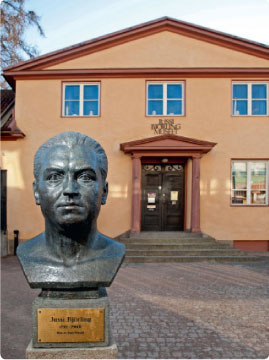Jussi of the Month February 2018
February 1957
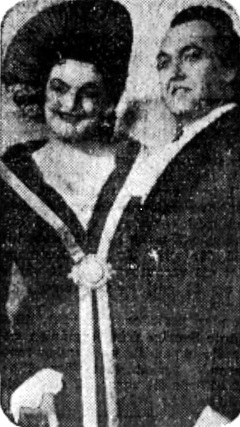
Birgit Nilsson and Jussi in Tosca on January 1957
Listen to M'appari tutt' amor from Marta by Flotow, recorded 1957
Hardly had he seen the beginning of February when it was time for the next excursion. This time it was ”only” to Copenhagen, where he had already been returning regularly for more than 25 years – always met with ovations. As so often the Concert Hall at Tivoli was waiting for him, and it was crowded at the concert on 4 February. ”Jussi Björling has never been singing more beautifully than last night, and he has probably never been singing before so many listeners in this city. All the seats and standing room were filled, and on the stage three rows of people were seated around the much beloved tenor” wrote the reviewer of Dagens Nyheder. In the previews the press had made heavy weather of Jussi’s loss of weight. ”One could clearly see on Jussi Björling, when he arrived by the last flight from Stockholm, before the train stopped”, wrote Socialdemokraten, ”that his tailor must have been busy taking in his clothes. And the slimness of the revitalized youngster – 15 kilos less than when he was here last summer – was accompanied by a youthful attitude and communicativeness, which usually isn’t his strongest suit.” And neither the audience nor the press were disappointed of what they saw and heard. ”Always the same Jussi” was the header in Land og Folk and Dagens Nyheder added ”There is only one Jussi”, while Axel Kierulf rounded off his glowing review in Politiken with ”Never has, I believe, Jussi Björling made such success, and that says a lot. But most of all it says that Jussi Björling now is at the height of his art – a singer of God’s faith.” Filled with admiration was also T.F. in Dagbladet Børsen: ”It must be regarded as a wonder, that he always has brilliance and power intact, considering what wear this voice has been exposed to. The programme last night may suggest that he has begun being more careful. It wasn’t the big arias, but Swedish, German and English love poetry, expressed in song that dominated. - - - Bu he didn’t make those disappointed who had come to hear his big show pieces. In Ture Rangström’s ”Tristans död” and a generous number of encores he displayed his voice in its fullest power, so it was no wonder that he eventually was near drowning in the noise from the audience’s prayers and ovations”. The same positive reactions permeate also the other reviews, who were unusually numerous.
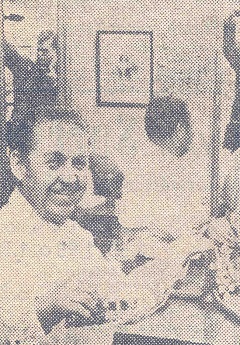
In the loge, Gothenburg on 6 February 1957
began: ”In splendid form and with enormous generosity Jussi Björling scattered the gold of his throat over grateful admirers who yesterdday filled the concert hall. They got their fill of the singer’s hits, which already have been executed innumerable times from the same stage and others in this city. Most appreciated were – of course – the opera arias - - - an imposing collection of favourites performed with the bravura and vocal splendour that is his distinguishing mark when he is at his best. Then there were of course Swedish romances of old established masters --- [which] showed ambitious tendencies towards the subtler paths where Jussi Björling too rarely wanders.”
Listen to Sverige recorded 1957
”The glory of the voice is there. It swells con massima forza without any traces of strain or coarse tone. No wonder that an instrument so superbly handled surpasses everything else on the market in a country so filled with bad music as the US”, wrote Björn Johansson, who thought that Jussi was best in the opera arias: ”There the high pressure of the beautiful sound carry the dramatic thrill. It is splendour all the way.” He was less impressed by the songs. ”The intimacy is lost. He is not alone with Schubert or Sjögren. He all the time sings to an audience, which is not the safest way into the text.” Nevertheless he appreciated ”Tristans död”: ”Better than Björlingg does it is impossible to imagine.”
It should be added that Harry Ebert ”as usual” was accompanist at both concerts but unfortunately not in his best form – at least according to Berlingske Tidende.
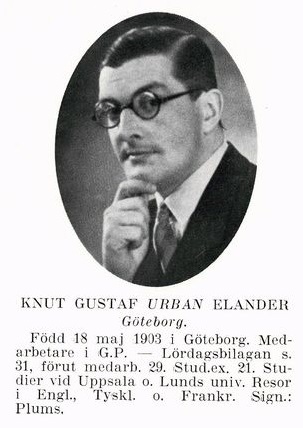
Urban Elander
The driver outside said: ”On the radio I’ve heard ’im, and a good voice he has, sure!” Indeed he has, Jussi, and now it sits in a new fine body too. Has Jussi ever been in better shape? He bows elegantly, his plasticity is fine, yeah, he’s a real Royal Court- and World singer…
Back home to Stockholm, and in Aïda he met another World Artist, Aase Nordmo-Lövberg in the title role. In the orchestra pit he found Sixten Ehrling, who got it good and proper from Folke H Thörnblom in Uppsala Nya Tidning: ”… [he] has to put up with some more nagging about his main sin: his obsession with the big sound of the orchestra. The soloists had sometimes a strenuous time to get through the orchestral sound, in particular the debutant*, but it should be admitted that the playing in the pit was excellent. ”Aïda on Sunday at lunchtime was one of those super performances that bring tears to the eyes of old habitués and gormandizers in vocal splendour. There was Aase Nordmo-Lövberg as Aïda, vocally possibly her very best role so far (though they are difficult to rank in her case). There was Jussi Björling, with his old voice and his new figure. Maybe it is unnecessary, as in the triumph scene, to wrap him in gold and red, as dazzling as a staniole paper around a piece of chocolate, even though one can say that Jussi belongs in Fru Fortuna’s best luxuory wrapping. He deserved the laurel wreaths the Opera Director presented him with after the last curtain fall with good wishes for the coming tours.” Lennart Swahn praised both the principal actors in Stockholms-Tidningen: ”Sweet Aïda, Jussi sang at his farewell for the season at the Opera last Sunday. And certainly, a sweeter-voiced Aïda than Aase Nordmo-Lövberg he will be hard-pressed to find in USA, where he will be before long. The couple’s joint tone production brought about high-grade vocal intoxication in the auditorium, and no wonder: we witnessed world class events!”
Teddy Nyblom of Aftonbladet was also impressed: ”Jussi Björling, our foremost vocal artist ever, ended his guest appearances this time in a more seldom-heard role: Radamès in Aïda. His artistry is at present at the height of spiritual and sound maturity, vocally he is more brilliant and all the same balanced than ever before with rich expressivity and his acting has reached far beyond routine and stereotypes. Gestures are sparse but the facial expressions are telling and the dignity of his posture as the victorious general was regal.”
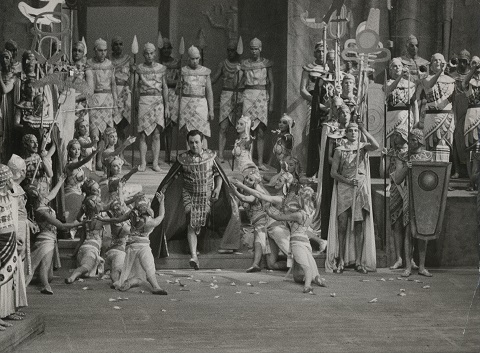
Aida on 4 June 1957, Royal Opera
Next Sunday, on 17 February, Jussi appeared in the Ed Sullivan Show in American TV – the programme that was considered to have more listeners and viewers all over USA than any other. There also participated actors Hugh O’Brien and Robert Wagner, comedian Jeannie Carson, baseball star Goose Tatum and, together with Jussi in excerpts from Rigoletto, Austrian soprano and Met-colleague Hilde Güden. They had appeared together only once on an operatic stage and that was just in Rigoletto at the Met four years earlier. Here also mezzo-soprano Thelma Votipka took part. She sang more frequently at the Met than any other woman, 1 422 times! This was also to be the last time Jussi appeared in American TV.
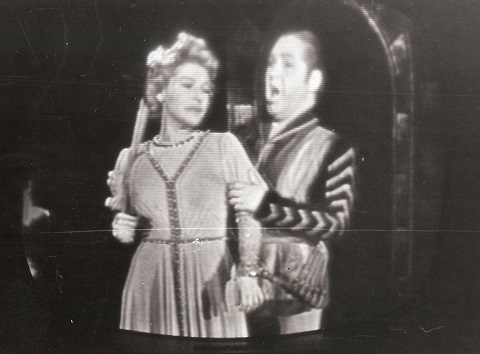
Hilde Güden and Jussi on 17 February 1957 in Ed Sullivan Show
Listen to La donna è mobile from Ed Sullivan Show
A possibly even greater soprano star he met again ten days later on the Metropolitan stage: Italian Renata Tebaldi. Both were highly esteemed and appreciated by the Met audiences and at their respective entries in the first act they were met with strong ovations that stopped the performance. For Jussi it was the first appearance of the season, which contributed extra much to the appreciation. Francis D Perkins in New York Herald Tribune wasn’t wholeheartedly positive to either soprano or tenor and stated that Leonard Warren, who sang Scarpia, also was below his best. Still he thought that Jussi’s singing was ”well-phrased and expressive” and that the quality of his voice was ”attractive”. Douglas Watt in The News wasn’t entirely positive either and felt that none of the three principals was particularly distinguished actors, but the praised Jussi’s voice which was ”in best form – pure, powerful and thrilling.”
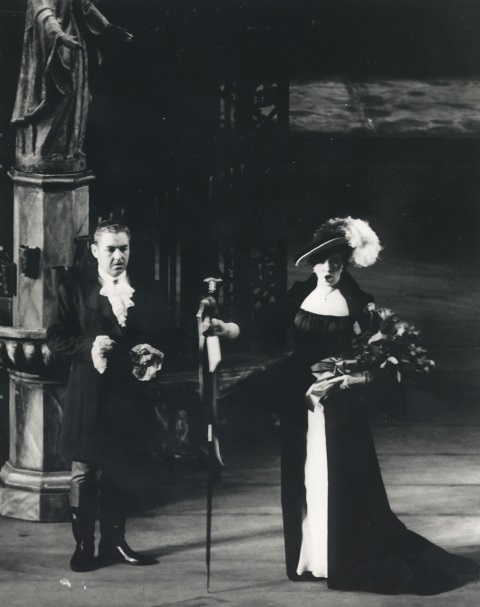
Jussi and Renata Tebaldi in Tosca, Metropolitan on 27 February 1957
By that the first two months of the year had come to an end. In March there were several concerts and opera performances to follow ”over there”, but to those there will be reason to come back further on.
Göran Forsling
* The debutant in the Aida performance was a young alto from Los Angeles, Henny Ekström as Amneris. What became of her later on I have not been able to find out. In 1974 she took part, however, in a performance of Bernd Alois Zimmermann’s vocal symphony ”Die Soldaten” in Basle – actually the first complete performance of the work. Several of the other soloists were in those days well-known names.




